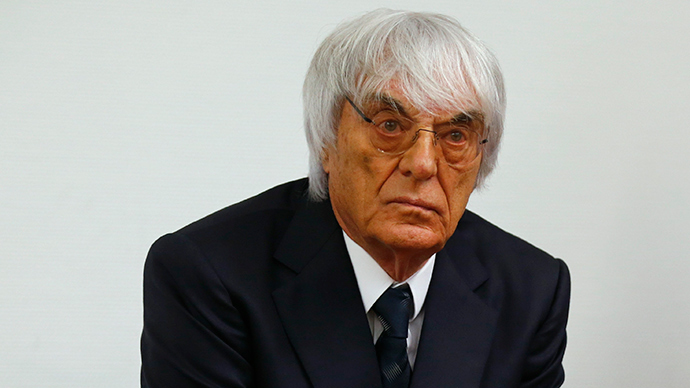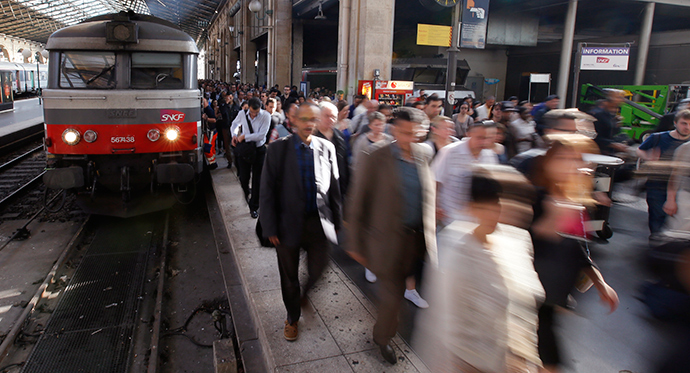Is “third world” Europe finished?

Formula 1 boss Bernie Ecclestone says “third world” Europe is finished and some British industrialists agree. However, the reality is far more complicated. It’s not the continent that's finished - it's Europe's neoliberal elites who are in peril.
Andy Street, the managing director of Britain’s prestigious retailer John Lewis claimed recently that France was “finished.” Mr. Street, wasn’t holding back, and described France as “sclerotic, hopeless and downbeat.” He added: “I’ve never been to a country more ill at ease… nothing works and worse, nobody cares about it.” Mr. Street has obviously never been to Africa or some pockets of Eastern Europe, then. He went on to describe Paris’ Gare Du Nord train station, as the “squalor pit of Europe.” Strong stuff.
Mr. Ecclestone, who has been moving F1 Grand Prix out of their traditional European bases, decided to lambast the entire continent. Not content with merely laying into his Gallic neighbors, he said all of Europe was “finished.” “Slowly but surely what I predicted about Europe is happening. What I said 10 years ago is that it would soon become a third world economy,” he told London’s Daily Telegraph. “Europe was built on Germany and France. That’s how it all started. France is gone and Germany doesn’t look good.”

The second part is correct. The modern EU stems from two post-war realities. Germany’s Ruhr had coal and steel resources and France didn’t. Also, France was afraid of another war with Germany - after two invasions in a quarter century - and interlinked prosperity guaranteed peace and mutual co-dependence. This was a great idea, no doubt about that. Sadly, it eventually led to the euro, which wasn’t such a good idea.
It’s not just the Brits who are bashing France, the Germans are joining in. Hans-Werner Sinn, President of Berlin’s Institute for Economic Research claims that “France’s industry has been dying for decades. Hiding the unemployed in government offices is not a healthy solution.”
There are 3.4 million people, officially, out of work in France. The real figure is probably much higher. For context, Napoleon’s famed Grande Armee numbered about 650,000 during its invasion of Russia - less than a fifth of the current jobless total. In theory, Francois Hollande could conquer most of Europe and make it all the way to Moscow, five times, with his army of the idle. Nonetheless, this would, like the euro, not be a very clever idea.
Before explaining the reasons for France’s woes and how the continent can be rebooted, let me first point out something important. British business leaders frequently use France as a convenient whipping boy, ignoring the failings of their country. The UK’s position, outside of London, is probably even more critical than that of France. While France has, undoubted, problems, the North of England is in a far worse state and is better compared to ex-communist states. It’s frightful.
There’s also the fact that the British, along with the Russians (for the most part), while geographically European, only see themselves as “slightly European.” This, possibly, comes from having been great empires and also from their location on opposite fringes of the continent. It also allows both to see Europe as a separate, far-away, entity - failing to account for how much their economies depend on it. In London discourse, Europe means the continental part; in Russia it generally means EU states.
Nevertheless, the problem is not France, or the UK (beyond London), nor Germany for that matter. It’s the failed ideology of neoliberal globalization. This ridiculous creed has crushed the working and middle-classes all over Europe. For the simple reason that it doesn’t work. You can't destroy your manufacturing base, via outsourcing, and then wonder why there are no decent jobs. Cause and effect - the two are completely interlinked
If you don’t believe me, look at the political parties which have suddenly gained popularity at the expense of the neoliberal establishment across the continent? From Ireland’s Sinn Fein to Spain’s Podemos and Greece’s Syriza, they all have common roots. All come from outside the center left elite, show little interest in trade unions and are working class in origin. As a consequence, the traditional European central-left are being decimated. Ireland’s Fianna Fail, Germany’s SPD and France’s Socialists are obvious examples.

In countries which have veered rightwards, again the nascent movements are rooted in the formerly prosperous middle and once aspirational working-classes: UKIP in Britain, France’s Front Nationale and Hungary’s Jobbik to name a few. Indeed, not long ago, Front Nationale couldn't get elected if they gave gold bars to every person in France. Now they are the most popular party in the country, according to polls.
This is where Russia comes in. All these newly popular movements admire Vladimir Putin - their leaders have stated it on record. Now, why could this be? After Russia was crushed by American-sponsored neoliberalism in the 90’s, he changed course. Putin reversed privatization of key industries, faced down the oligarchs and restored state power. As a result, Russians have enjoyed the greatest prosperity they have ever known. The country has close to full employment, while Western Europe, though mostly wealthier by per capita GDP, is in a terrible state. Of course, neoliberalism enthusiasts hate Putin.
People across Europe are rebelling against a neoliberal agenda that is out of control. They feel disenfranchised and powerless and want rid of an establishment which is seen to have failed. The global banking crisis of 2008 was caused by failures in this flawed ideology. However, its acolytes have used the media to convince ordinary working people that they were to blame. Hence we have austerity for the majority and quantitative easing (money printing) for the super-rich. It's Robin Hood in reverse.
Is Europe finished? No, it's not. However, Europe, as it has been run for the past few decades, is finished. The era of unlimited population movement and huge financial transfers from west to east is, almost, kaput.
2017 is the key. If David Cameron gets re-elected, there will be an In/Out EU referendum in the UK in 2017. There’s a growing possibility that Front Nationale leader Marine Le Pen – who’s said she expects “nothing from Europe apart from destruction” – could win the French Presidential election which is also due that year. Furthermore, Switzerland will vote in late 2016 on the country's relationship with the EU. Should they vote to break ties - largely over free-movement of people - a crisis will emerge.
If the neoliberal elites want to salvage their beloved European project, their window to effect meaningful change is not quite closed. If they continue to fiddle while the Treaty of Rome burns, expect a very different Europe to emerge. One where national interests will trump collective ideals. A continent where some states will stoop to Ecclestone's “third world” description and others - freed from Brussels' shackles - will prosper.
The statements, views and opinions expressed in this column are solely those of the author and do not necessarily represent those of RT.
The statements, views and opinions expressed in this column are solely those of the author and do not necessarily represent those of RT.













